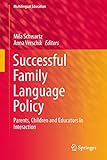Successful family language policy: parents, children and educators in interaction/ ed by Mila Schwartz and Anna Verschik.
Series: Publication details: Dordrecht: Springer, 2013.Description: viii, 295p. illustrationsISBN:- 9789400777521
- 306.44 Q3
| Item type | Current library | Call number | Status | Date due | Barcode | Item holds |
|---|---|---|---|---|---|---|
 Books
Books
|
Mahatma Gandhi University Library General Stacks | 306.44 Q3 (Browse shelf(Opens below)) | Available | 52582 |
Browsing Mahatma Gandhi University Library shelves, Shelving location: General Stacks Close shelf browser (Hides shelf browser)
| No cover image available |

|

|

|

|

|

|
||
| 306.44 P62 Explorations in culture of peace/ | 306.44 Q02 Language and gender / | 306.44 Q12 Language and gender: a reader/ | 306.44 Q3 Successful family language policy: | 306.44 Q31 The Oxford handbook of sociolinguistics/ | 306.44 Q5 The language of organizational styling/ | 306.44 Q5 Endangered languages : |
Includes bibliographical references.
This book presents the forefront of research in the emerging field of family language policy. This is the first volume to explore the link between family language policy, practice and management in the light of state and community language policy in more than 20 ethno-linguistic communities worldwide. Contributions by leading scholars from eight countries and three continents offer insights in how family language policy might be interpreted from various theoretical perspectives, using innovative methodologies. In particular, the authors present novel data on successful family language practices such as faith-related literacy activities and homework sessions, as well as management, including prayer, choice of bilingual education, and links with mainstream and complementary learning, which permit the realization of language ideology within three contexts: immigrant families, inter-marriage families, and minority and majority families in conflict-ridden societies.


There are no comments on this title.